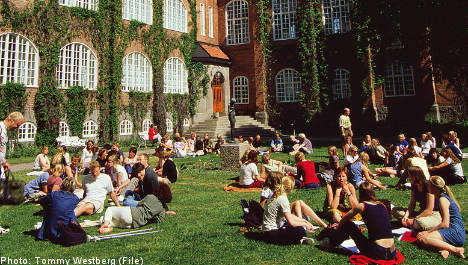“There is a high probability that fewer places will be on offer to foreign students,” Alexandra Sjöstrand, an investigator at the agency, told The Local on Friday.
In practice the changes mean that there will be four new sub-groups within the group of applicants admitted on their high-school grades: Swedish grades, Swedish grades supplemented with further study, foreign grades, and (Swedish) Folk High School grades.
Previously, all the various non-Swedish standard grade systems were translated into an equivalent Swedish grade for consideration. Students, both Swedish and non-Swedish, will still be able to apply through the Swedish Scholastic Aptitude Test (Högskoleprovet) or through the alternative application category, which has been increased to 30 percent of places under the new regulations.
Sjöstrand confirmed that the agency has told the government that the new regulations could be discriminatory against other EU citizens and thus in breach of EU law.
“We looked through the existing legislation and there could be a problem. But this is something that would have to be tried in court. We have made it perfectly clear that it should be looked at,” she said.
The new rules come into force in the autumn as part of the government’s aim to encourage Swedish high-school children to favour certain subjects. Maths and modern languages, for example, will now be awarded separate bonus points.
“It is possible that the government could argue to the EU that the bonus points lack a comparable system internationally. The bonus system is adapted to the Swedish system,” Sjöstrand said.
According to Sjöstrand, the government has agreed to allow those holding Swedish (and Finno-Swedish) International/European Baccalaureate (IB/EB) grades to qualify through the Swedish grades category.
The agency said that those with IB/EB grades issued by other countries would qualify for consideration within the Swedish grade category.
The changes therefore mean that anyone with high-school qualifications from an alternative grades system – such as the UK A-Level system and the US high school diploma or GED systems, will be limited to the foreign grades category.
“This does not necessarily mean fewer places, as they are allocated according to the number of qualified students applying, but in subjects less popular with foreign students there is a high probability that assigned places will decline,” Alexandra Sjöstrand told The Local.
The Local has made attempts to contact the Minister for Higher Education and Research, Tobias Krantz, but was told that he was unavailable for comment.



 Please whitelist us to continue reading.
Please whitelist us to continue reading.
Member comments